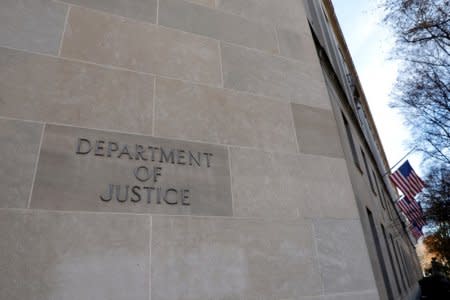Justice Department asks appeals court to end Trump emoluments case

Thomson Reuters
By Jan Wolfe
WASHINGTON (Reuters) - The Justice Department on Monday asked a federal appeals court to step in and halt a lawsuit accusing President Donald Trump of violating anti-corruption provisions in the U.S. Constitution after the trial judge ruled the case could proceed.
The department asked the Richmond, Virginia-based 4th U.S. Circuit Court of Appeals to reverse U.S. District Judge Peter Messitte's rulings that let the Democratic attorneys general of Maryland and the District of Columbia move ahead with the lawsuit against the Republican president, including requests for tax returns and revenue statements.
The department's request represents an aggressive legal move because federal appellate courts like the 4th Circuit typically do not weigh in on legal disputes until there is a judgment at a lower court level. Trump's legal team said this was a rare case in which emergency interim relief was necessary.
The two attorneys general on Dec. 4 issued subpoenas for financial records from Trump's businesses as part of their lawsuit that said his dealings with foreign governments have violated the Constitution's so-called emoluments provisions.
"The complaint rests on a host of novel and fundamentally flawed constitutional premises, and litigating the claims would entail intrusive discovery into the President's personal financial affairs and the official actions of his Administration," Trump's lawyers said in a court filing.
Karl Racine, the District of Columbia's attorney general, said in a statement that Trump "is going to extraordinary lengths to try to stop us from gathering information about how he is illegally profiting from the presidency."
Requests for such an expedited appeal rarely succeed, according to Boston College Law School professor George Brown. But Brown said the 4th Circuit might grant this request because the case implicates the president and raises novel legal questions.
The lawsuit, filed in June 2017, said Trump failed to disentangle himself from his hotels and other businesses, making him vulnerable to inducements by foreign officials seeking to curry favor. One of the Constitution's emoluments provisions bars U.S. officials from accepting gifts or other emoluments from foreign governments without congressional approval.
Messitte, presiding over the case in Greenbelt, Maryland, has narrowed the lawsuit to claims involving Trump International Hotel in Washington and not Trump's businesses beyond the U.S. capital.
Messitte ruled in March that the two attorneys general had legal standing to pursue the case, and in July rejected what he called Trump's "cramped" view that emoluments were limited essentially to outright bribes.
Those rulings allowed the case to enter the discovery phase, evidence-gathering that could force disclosure of Trump's financial records.
(Reporting by Jan Wolfe; Editing by Will Dunham)
See Also:

 Yahoo News
Yahoo News 
